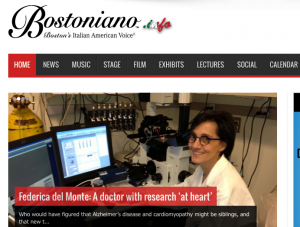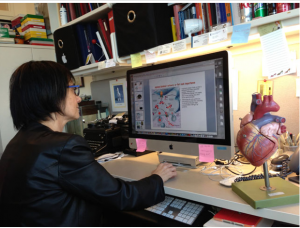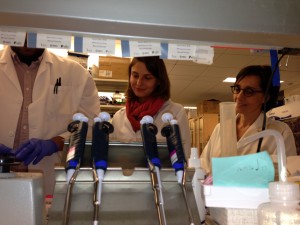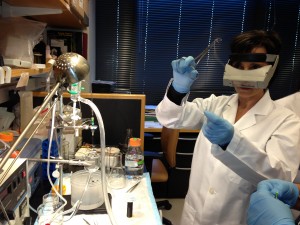 Who would have figured that Alzheimer’s disease and cardiomyopathy might be siblings, and that new therapies for both might be found simultaneously? In fact, nobody knows for sure, but Dr. Federica del Monte, assistant professor at Harvard Medical School thinks so. Otherwise, she wouldn’t have spent most of her waking life for the past 15 years in the relentless pursuit of a non-surgical cure for dilated cardiomyopathy, a progressive heart disease that unnaturally enlarges the body’s main muscle, eventually causing it to fail.
Who would have figured that Alzheimer’s disease and cardiomyopathy might be siblings, and that new therapies for both might be found simultaneously? In fact, nobody knows for sure, but Dr. Federica del Monte, assistant professor at Harvard Medical School thinks so. Otherwise, she wouldn’t have spent most of her waking life for the past 15 years in the relentless pursuit of a non-surgical cure for dilated cardiomyopathy, a progressive heart disease that unnaturally enlarges the body’s main muscle, eventually causing it to fail.
In some cases, the culprits is the plaque that builds up around the heart, often reaching critical levels too late in life for a patient to safely withstand a transplant. According to Federica — a Ducati-street-bike-driving researcher, author of many publication and recipient of the 1999 American Heart Association Award — the plaque that builds up in our hearts is similar to the plaque that forms in the brain Alzheimer’s patients and victims of other neurological conditions such as multiple sclerosis and Lou Gehrig’s and Parkinson’s diseases.
 “I believe in it,” she says as she prepares a slide for her next presentation at an international conference. “And if is true, this concept could be a breakthrough for medicine at large.” It’s the reason that Federica decided to go into research in the 1980s while she was a medicine student in Rome: “to cure many patients at once!”
“I believe in it,” she says as she prepares a slide for her next presentation at an international conference. “And if is true, this concept could be a breakthrough for medicine at large.” It’s the reason that Federica decided to go into research in the 1980s while she was a medicine student in Rome: “to cure many patients at once!”
However she also always wanted to cure them one at a time. “Becoming an M.D. in the United States is one of my goals,” she says, admitting that, “studying for it takes an amount of time and energy that research doesn’t always afford me.”
Research has been a major part of Federica’s life since 1989, when her professor and mentor, Dr. Attilio Reale, then president of the European Society of Cardiology, sent her to specialize in England. Her two-year stint at the London Imperial College turned into a four-year stay.
With laboratory and a whole research group under her direction today, she is sometimes awakened in the middle of the night to study a heart freshly extracted from a patient who just received a new one from a deceased donor. “Sure I could say ‘Not tonight’, but I never do,” she explains. “It would just be unethical for me to ‘waste’ a heart.”
 Her drive has been relentless over the years, sometimes taking a toll on her private life — so focused (scientifically) is she on her patients’ hearts that she occasionally forgets (figuratively) to take care of her own.
Her drive has been relentless over the years, sometimes taking a toll on her private life — so focused (scientifically) is she on her patients’ hearts that she occasionally forgets (figuratively) to take care of her own.
“Of course, being in Boston, surrounded by such a science- and research-charged environment, helps keep my eyes on the ball,” she reckons, adding, “This does not mean excellence only lives here. Europe, and even Italy, contrary to what many tend to think, is full of outstanding research centers and scientists operating in my field.”
Better structures and funding have long existed in the United States in general and Boston in particular. But in times of fiscal crisis, the competition can be fierce, and Federica’s admits that the publish-or-perish mentality of her profession can become a distracting (and sometimes even destructive) factor.
 Yet Dr. del Monte has no intention of abandoning her post anytime soon, even though her reputation and Harvard-emblazoned credentials would easily allow her to successfully pursue her career elsewhere. “Under the right conditions, I wouldn’t mind one day returning to Europe,” she says while putting on her white coat on the way to the lab, where she will soon dissect yet another heart, “but for now, there are too many things I still want to do here!”
Yet Dr. del Monte has no intention of abandoning her post anytime soon, even though her reputation and Harvard-emblazoned credentials would easily allow her to successfully pursue her career elsewhere. “Under the right conditions, I wouldn’t mind one day returning to Europe,” she says while putting on her white coat on the way to the lab, where she will soon dissect yet another heart, “but for now, there are too many things I still want to do here!”
